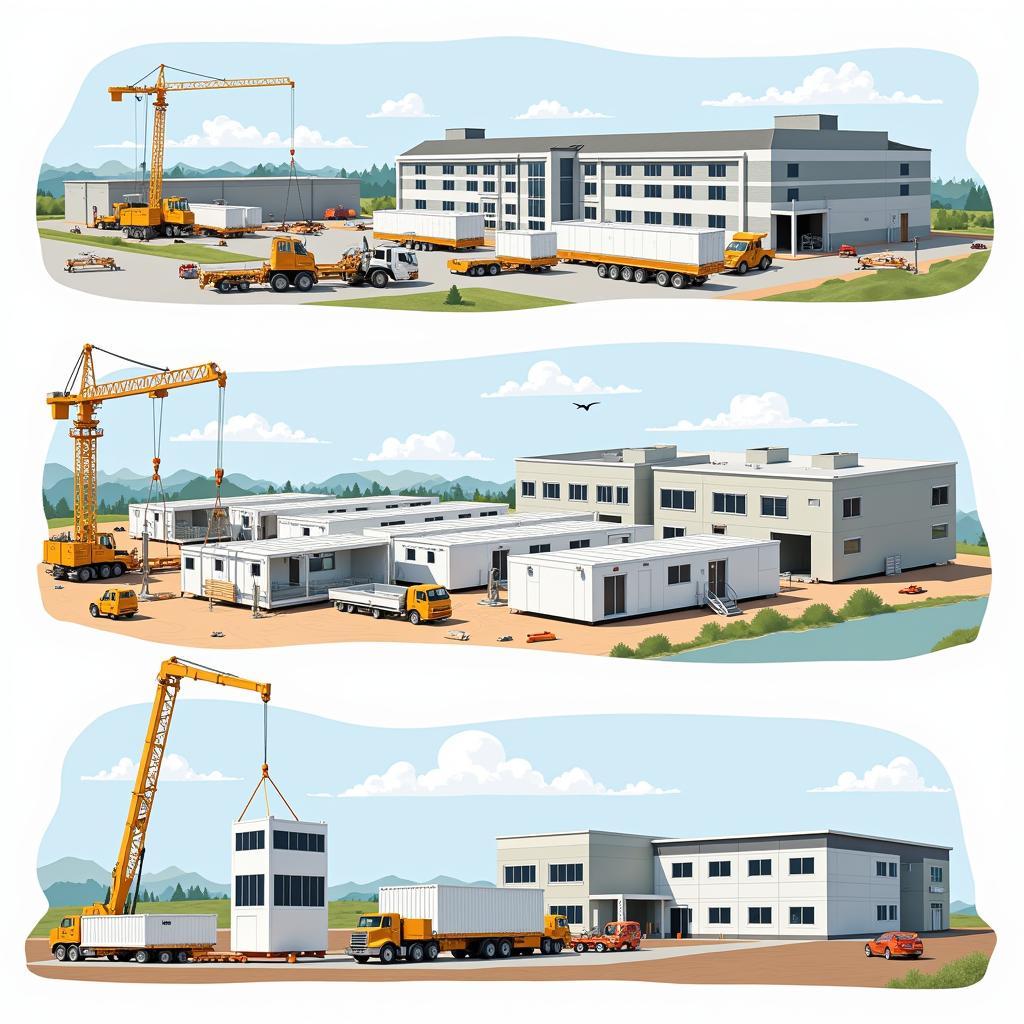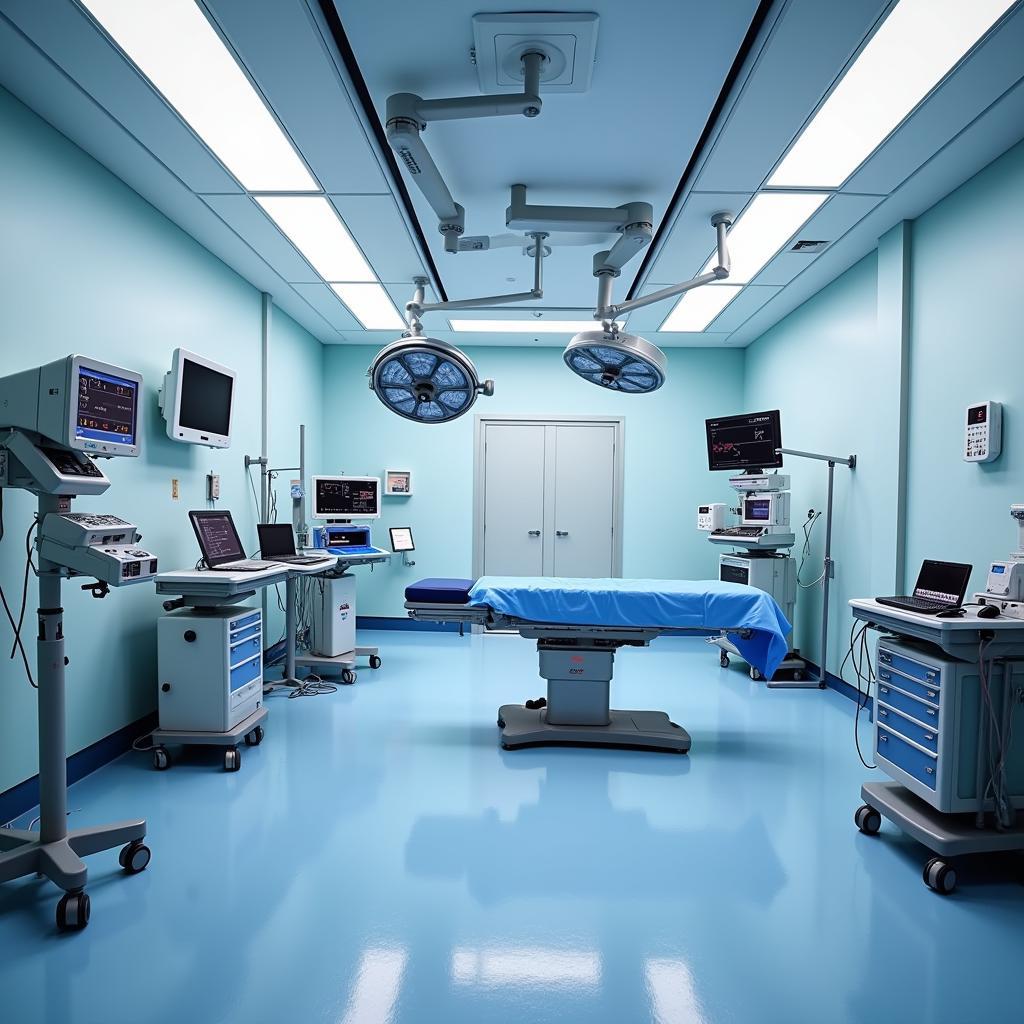Modular Hospital Construction is rapidly transforming the healthcare landscape, offering a faster, more efficient, and cost-effective approach to building and expanding medical facilities. This innovative method utilizes prefabricated modules built in a controlled factory environment and then transported to the site for assembly. This process significantly reduces construction time and minimizes disruption to ongoing hospital operations.  Modular Hospital Construction Process in Action
Modular Hospital Construction Process in Action
Understanding Modular Hospital Construction
What exactly is modular construction and how does it apply to hospitals? Modular construction involves creating building sections, or modules, in a factory setting. These modules are complete with interior finishes, fixtures, and even medical equipment. They are then transported to the construction site and assembled, like building blocks, to create the final structure. This method contrasts sharply with traditional construction, which occurs entirely on-site and can be subject to weather delays and other unforeseen issues. Modular construction offers a controlled environment, allowing for greater precision and quality control. For hospitals, this translates into faster project completion, reduced costs, and minimal disruption to patient care.
Benefits of Modular Construction for Hospitals
The advantages of modular hospital construction are numerous and compelling. From reduced construction timelines to improved sustainability, this innovative approach is reshaping the future of healthcare infrastructure. Some of the key benefits include:
- Speed: Modular construction can significantly reduce project completion times by as much as 50% compared to traditional methods.
- Cost-Effectiveness: The controlled factory environment minimizes material waste and labor costs, resulting in significant savings.
- Flexibility and Scalability: Modular units can be easily added or removed to accommodate changing needs, making it ideal for future expansion.
- Quality Control: The factory setting allows for stricter quality control measures, ensuring higher quality construction and finishes.
 State-of-the-art Modular Hospital Operating Room
State-of-the-art Modular Hospital Operating Room - Sustainability: Modular construction generates less waste and utilizes sustainable materials, contributing to a greener approach to building.
“Modular construction is not just a trend; it’s a paradigm shift in how we build hospitals,” says Dr. Amelia Carter, Chief of Surgery at City General Hospital. “The speed and efficiency are game-changers, allowing us to expand our facilities and deliver better patient care.”
Addressing Common Concerns about Modular Hospitals
Some healthcare providers may have concerns about the durability and quality of modular hospitals. However, these concerns are often unfounded. Modular hospitals are built to the same stringent building codes and standards as traditionally constructed facilities. They are designed to withstand extreme weather conditions and are equipped with state-of-the-art medical technology.
How Modular Construction is Changing Healthcare Design
Modular construction is not only changing how hospitals are built, but also how they are designed. The flexibility of modular units allows architects and designers to create innovative and adaptable spaces. This is particularly important in today’s rapidly evolving healthcare environment.
- Customized Designs: Modular units can be customized to meet the specific needs of different departments, from emergency rooms to intensive care units.
- Improved Patient Experience: Modular design can create a more patient-centered environment with improved natural light, noise reduction, and enhanced privacy.
- Adaptability for Future Needs: Modular construction allows hospitals to easily adapt to changing demographics, technological advancements, and evolving healthcare practices.
“The adaptability of modular design is invaluable,” explains architect David Miller, specializing in healthcare facilities. “It allows us to create hospitals that can evolve and adapt to the ever-changing needs of the healthcare industry.”
Conclusion: Embracing the Future of Healthcare Construction with Modular Design
Modular hospital construction is revolutionizing the healthcare industry, offering a faster, more efficient, and sustainable way to build and expand medical facilities. From reduced construction times to improved flexibility and quality control, the benefits of modular construction are clear. By embracing this innovative approach, hospitals can improve patient care, enhance operational efficiency, and create a more sustainable future for healthcare.
east central regional hospital square footage
FAQ
- Are modular hospitals as durable as traditionally built hospitals? Yes, modular hospitals are built to the same stringent building codes and standards.
- Can modular hospitals be customized? Yes, modular units can be customized to meet specific needs.
- How long does it take to build a modular hospital? Modular construction can reduce project completion times by up to 50%.
- Are modular hospitals more expensive? No, modular construction is often more cost-effective than traditional methods.
- What are the environmental benefits of modular construction? Modular construction generates less waste and utilizes sustainable materials.
When you need support, please contact Phone Number: 02437655121, Email: [email protected] Or visit the address: No. 298 Cau Dien Street, Minh Khai, Bac Tu Liem, Hanoi, Vietnam. We have a 24/7 customer care team.